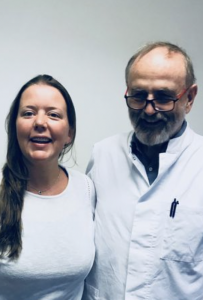Police Detective Uncovers New Passion after Cancer
- Former police detective Hannah Bailey, 44, was relieved when a breast cancer diagnosis meant she would need to take an extended leave from work. After beating cancer, she sought another career.
- Her cancer was first detected via a lump in her breast; she treated it with chemotherapy and surgery.
- Some people may choose to work through a cancer diagnosis to retain some sense of normalcy and distraction through their health battle.
Speaking with The Mirror Bailey says she was “relieved” to be diagnosed with cancer at the time because her mental health was suffering due to her job. She felt anxiety from working on projects involving serious crimes, like human trafficking and criminal gangs.
Read More
“I think this was the first time that I started to realize just how bad things had been at work when you feel relief that your cancer diagnosis offers an escape route out." Hannah Bailey
"I also blamed myself I thought I was the only one on the team feeling like this and I just wasn't tough enough or good enough to deal with it all," admits Bailey.
Bailey’s Breast Cancer Journey & Treatment
Her stresses of the job impacted her mental health. And her physical health was also at risk when, in 2011, she discovered a lump on her left breast. She was sent for tests and in June 2011, at age 34, she was diagnosed with breast cancer.

“My family were shell shocked,” says Bailey. “My daughter was three at the time and my son was six and we had to tell them something as I was going to have surgery, so we told them I wasn’t feeling well and would be better after having an operation.”
Bailey explains how she felt relief, knowing her health battle would require her to take time away from work. She says, “It slowly dawned on me that I would now be on long-term sick from work, and that meant an escape from the workload, the victims, the court files…I think this was the first time that I started to realize just how bad things had been at work when you feel relief that your cancer diagnosis offers an escape route out."
Bailey was able to take nine months of sick leave with full pay. She had surgery a common breast cancer treatment to remove the lump. She also had chemotherapy treatment for 5 months. After returning to work, she wore a wig due to hair loss from chemotherapy. Bailey says she felt stressed still at work; “I felt incredibly self-conscious and worried constantly that if I went to a job or arrested a prisoner that my wig might be pulled off.”
In June 2012, her breast cancer returned, and she underwent a full mastectomy and breast reconstruction. She also had a cancer treatment in Germany called dendritic cell vaccine therapy.
Following her second bout of cancer, Bailey quit her job on the police force and became a life coach and psychotherapist. Sometimes, a cancer diagnosis is the catalyst needed for positive changes in our lives.
When Should You Consider a Mastectomy?
Working Through Cancer
Bailey was thankfully able to take time away from work while fighting breast cancer, and it allowed her the needed perspective she craved. Some people may choose to work through their cancer.
A cancer diagnosis can be a life-altering event, and finding pockets of normalcy during the cancer journey is often welcome. For most people, going to work every day if you're well enough to do so can be an effective strategy for keeping things as "normal" as possible during an abnormal health event like cancer.
Laurie Ostacher, a social worker at Sutter Bay Medical Foundation, says in an earlier interview how important a person's career may be to them, even during the cancer journey. She explains, "Some women choose to continue working [through cancer] because working is a significant part of their identity, they enjoy the job, and there's flexibility built in."
"I help folks think about whether it makes sense to work," she says. "If you really don't want to but are worried you're not going to be able to make ends meet, then I'll sit down and help them figure out, you know, with your disability insurance, would this be possible?"
Ostacher explains the questions she might pose to women to probe them to think about how their work-life might look through cancer. She says, "For women who choose to work, I help them think about what types of conversations do you need to have with their employer? How much information do you want to share with him or her? What type of work schedule seems like it might work for you? Where might you need more flexibility?"
Working During Your Cancer Treatment
Learn more about SurvivorNet's rigorous medical review process.


